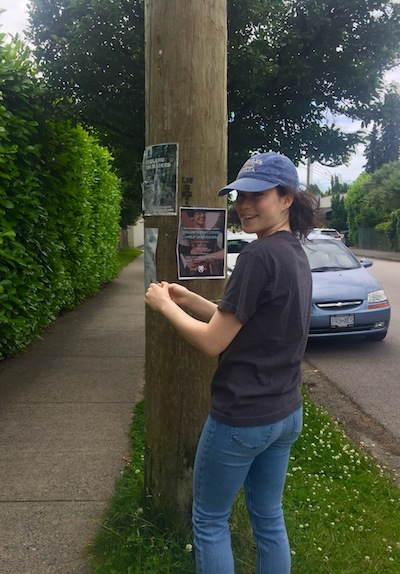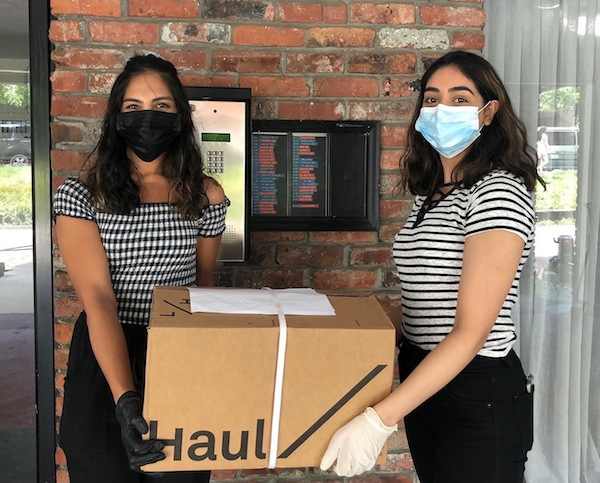COVIDhelp Vancouver founders Imaan Jiwa, left, and Riva Siddiqui. (photo from COVIDhelp Vancouver)
An all-female team of Vancouver-area university students has created a platform to link people who may be more likely to succumb to COVID-19 with volunteers who can help them with essential tasks.
COVIDhelp Vancouver was launched by the University of British Columbia’s Imaan Jiwa and Riva Siddiqui shortly after the coronavirus was declared a pandemic in the spring. Soon thereafter they were joined by Jewish community member Rebecca Baron, who came on board as director of outreach communication.
The organization’s objective is to assist anyone they can, i.e., seniors and the immune-compromised, with such activities as grocery shopping, dog walking and the delivery of medicines. Volunteers also provide companionship for those who have been isolated as a result of the virus, through both online and socially distanced chats.
The students have provided a few ways for volunteers and clients to connect: the internet, telephone and a mobile app.
“We are trying to get to as many people as we can and create a platform to support our community,” Baron told the Jewish Independent. “This service is intended for anyone who needs support during this time, whether they are seniors, people with compromised immune systems, those who have recently returned from abroad, single parents, students unable to travel back home, frontline workers, or anyone else.”
As for her own involvement, Baron credited Vancouver Talmud Torah. “It taught me a lot about chesed [loving kindness] and helping people in the community,” she said.

Currently a third-year student in UBC’s Global Resource Systems Program, with a focus on global health and nutrition, Baron’s contributions to the community and beyond have been recognized. In 2017, she was the inaugural recipient of Temple Sholom’s Teen Tikkun Olam Award for her research on air quality and her efforts to address gender inequality in the sciences. That same year, she was one of the 18 young people honoured by the Jewish Independent with a JI Chai Award, receiving it for her science research and promotion, as well as her extensive and varied volunteer work.
Besides uniting volunteers with people in need, Baron’s other current pursuits include improving global literacy and advancing education for girls to ensure that all women receive equal opportunity in the workforce.
At present, there are more than 40 volunteers who have accomplished more than 30 tasks, and the COVIDhelp Vancouver team expects those numbers to grow.
The services offered are free, but the client has to arrange for payment of groceries and other goods. They can do this by paying the supplier directly or by ensuring the volunteer has the funds, pre-paying the helper via an e-transfer or PayPal payment, with cash as a last resort.
“All necessary precautions are maintained,” Baron said. “Our volunteers wear masks, use gloves and hand sanitizers and maintain social distance.”
She noted, “The current senior demographic in Vancouver makes up more than 15% of our entire population and this includes our grandparents, neighbours, great-aunts and -uncles. Those who are more likely to become severely ill or require intensive care might also experience a higher level of social isolation. The effects are compounded for those who don’t have access to technology platforms or have limited experience navigating the web. To help them stay connected, feel involved, purposeful and less lonely, we have created a COVID helpline. Now, all they have to do is dial our number and help will be on the way.”
COVIDhelp Vancouver stresses that all volunteers and users must adhere to health and hygiene requirements. Volunteers are screened before any client’s contact information is released.
Both founders of COVIDhelp Vancouver, Jiwa and Siddiqui, are masters of business management candidates at UBC. Jiwa, who just finished a bachelor’s degree in psychology, has a strong interest in the connections between social entrepreneurship and technology. For her part, Siddiqui hopes to create stronger pillars in society by strengthening social connections.
Other members of the team include volunteer coordinator Aimee Gray, who is completing her BSc in psychology at the University of Victoria and who also has an interest in learning about growing businesses, and Camryn Pederson, a UBC psychology student who wants to destigmatize mental illness and bolster community ties through volunteerism.
Those who wish to volunteer can do so by downloading the Zelos Team Management app on an iPhone or Android device, register as a volunteer and join the COVIDhelp Vancouver workspace. Volunteers should be healthy, display no symptoms of COVID-19, have not traveled or been in contact with anyone ill within the past 14 days and be practising social distancing.
Anyone who wants to spread the word by printing posters can download them from COVIDhelpvancouver.com.
Anyone who needs services should call 778-280-8686, leave a name and number and provide as much information about their request(s) as possible.
Sam Margolis has written for the Globe and Mail, the National Post, UPI and MSNBC.

